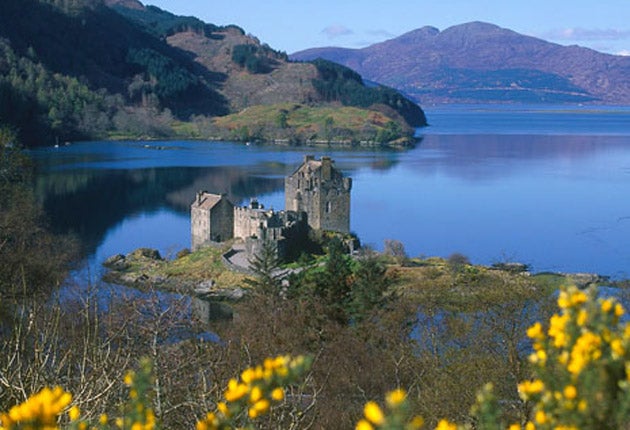Yours for £1,000: a Caribbean cruise, or a return ticket to the Kyle of Lochalsh
For the first time, a UK rail fare breaks the four-figure barrier

It is a sinking feeling familiar to thousands of rail passengers. Packed and ready to travel, their optimistic expectations of a trip on Britain's railways can be swiftly quashed by the eye-wateringly high fare prices demanded at the ticket office.
Anyone who has grudgingly forked out more than they would have liked for their trip might count themselves lucky following the revelation that, for the first time, unfortunate travellers on one route will be forced to stump up more than £1,000 for their ticket.
Passengers wishing temporarily to swap the party culture of Newquay, Cornwall, for the more serene pace of life enjoyed in the sleepy coastal village of the Kyle of Lochalsh, in the Scottish Highlands, will have to pay £1,002 for the privilege after the latest round of fare hikes. Enquiries carried out by The Independent found that a passenger could opt for a one-week luxury cruise in the Caribbean instead, together with flights to and from Puerto Rico, and still come home with £50 change.
Any travellers wanting a return "walk on" ticket in a first-class carriage for the 20hr 30min trip would be charged the record-breaking figure, which was discovered as part of a survey carried out by Barry Doe, a public transport consultant. He found that passengers would not even enjoy the luxury of a first-class cabin for two sections of the trip (the journey involves changing three times) and anyone wanting to get any sleep would have to fork out an extra £43 for a sleeper.
Tickets for the 1,700-mile return journey are available through the CrossCountry train firm. A spokesman for the company said: "No one has actually bought this £1,000 fare but it does exist. Someone wanting a first-class return would be likely to book a saver return in advance and pay £561."
Mr Doe's survey also revealed that some standard "walk on" return fares had doubled in price since the mid-1990s. Other trips seeing a major rise included the London-to-Manchester route, increasing from £33 in 1995 to £66.10, and a London-to-Newcastle return ticket, which had seen an 84 per cent price rise over the same period to £105.
Prices shot up again at the start of this year, despite the onset of the recession. Passenger groups were furious after fares on some routes rose by more than 10 per cent. Regulated fares, such as season tickets and off-peak tickets, increased by an average of 6 per cent, with the cost of an advance fare rising by an average of 7 per cent across Britain.
Although the ticketing system for trains has been simplified, many passengers still complain that "walk-on" fares are still far too high, while confusion often reigns over which trains can be caught using an advance-purchase tickets. Cat Hobbs, from the Campaign for Better Transport, said the £1,000 fare showed that huge problems remained with the rail network's pricing system. "Fares in this country are far too expensive," she said. "They are the most expensive in Europe. We think the Government should step in and review how they regulate fares."
Norman Baker, the Liberal Democrat transport spokesman, said that the first £1,000 ticket was an "unwelcome landmark" that would do nothing to convince more people to travel by rail. "When you can fly half way across Europe for £30, the idea that you can end up paying £1,000 for a train journey in Britain is absolutely scandalous," he said. "Not only are passengers being encouraged off the trains and into their cars, but some considering this journey may decide they'd rather fly to Australia and back for half the price."
The shadow Transport minister, Stephen Hammond, said: "Fare payers have become all too used to appalling value for money. Today's revelation of a £1,000 fare really takes the biscuit."
Off the rails: Other ways could you spend the train fare
* Thirty-one flights from London to Edinburgh: £991.65. Flights from London Stansted: £31.99 each, including taxes.
* One-week Caribbean cruise, plus flights to San Juan, Puerto Rico: £945. Flights from London: £539. Cruise: Adventure of the Seas, £406, visiting Bridgetown, Barbados; Castries, St Lucia; St John's, Antigua; Philipsburg, St Maarten; St Croix, US Virgin Islands.
* Second-hand Ford Escort, bought in Newquay, with enough petrol for the 1,700-mile round trip: £877.20. Cost of car: red Ford Escort 1.6 SI, bought from Newquay's Newmans Automotive: £599. Petrol costs: £278.20; around 57 gallons needed, using fuel at 30 miles to the gallon.
* Taxi fare from Newquay to Kyle of Lochalsh and back again: £800. Two people sharing a minibus run by Don's Cabs, Newquay, would have to shell out £800 each for the return journey, but would have enough space to stretch out for a kip.
Join our commenting forum
Join thought-provoking conversations, follow other Independent readers and see their replies
Comments